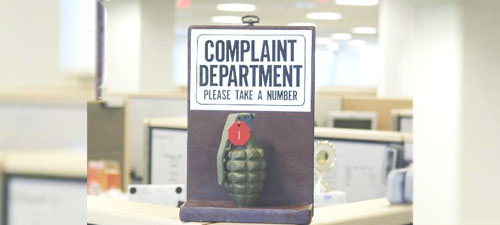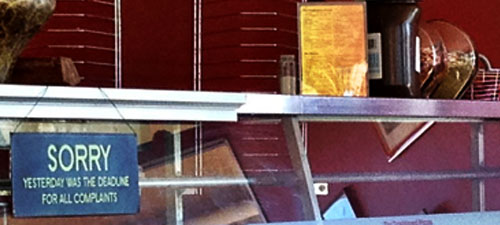
Image via Rev. Xanatos Satanicos Bombasticos (Flickr CC)
Recently, someone drew my attention to a viral Yelp review from a restaurant in Kansas City. Obviously, this proud Chef/Owner had given this conundrum a lot of thought, and chose to leave revenue on the table so that the restaurant’s guests were presented with his best effort and the dishes could be fully enjoyed when complemented by presentation and atmosphere.
It led me to wonder if the reviewer would have written a scathing review had they paid a high price tag for entrees that undoubtedly would have been less than the Chef had imagined after packaging in a carryout container and delivered. Would that have elicited a response of “I can’t believe I paid XXX for my entrée at XXXXX. When delivered, it was less than appealing, lukewarm, and the sauce had congealed into something similar to stale (name your condiment)”?
Certainly, it is much easier to negatively review anything under the cloak of anonymity given by the Internet, and as such, endure no repercussions. In the above Yelp example, the reviewer simply deleted their review, and then their profile from Yelp.
Not so easy for a restaurant to dodge.
I found it very heartening how many people came to the support of this small business owner, who had made a decision to not offer take-out. Comments were left for the restaurant on Yelp, Facebook, and the blog linked above from both regular customers and new fans, saying how they understood the stance of the business and not that of the reviewer’s complaints.
I thought it was an interesting example of how social media has changed the interactions between patrons and businesses.

Image via Theen Moy (Flickr CC)
At Bottleneck Management, we have a first-hand view of how this has impacted the restaurant business. Every Tuesday, Lee Jarvis, our in-house Social Media & Digital Marketing Manager, compiles a list of all reviews received via social media the previous week at all of our seven stores. Admittedly, this ranks very near the top of the list of emails that I don’t want to open or read, as I personally have a love/hate relationship with review sites. I inevitably save this email for late in the day when I can take a deep breath and absorb what has been written. Most of the reviews are positive and usually very objective, but unfortunately there are also reviewers who seem to thrive on taking an abusive and personal tone in their writing.
My feeling of ‘hate’ toward review sites is very simple. As a small business owner, we are eager to admit mistakes and do whatever we can to make the situation better. However, it is infinitely easier to do this in the moment with in-person interaction between our manager and the guest; our team has been expertly trained to address the situation appropriately and take all steps to rectify any shortcomings. It is more painful to hear any complaints on how we provided a disappointing meal, or slow service, or bland experience, etc. after the fact, when nothing can be done face to face, and a guest may lash out with a bad review in the heat of the moment. A guest who suggests that we provided them with the worst dining experience of their life obviously never ate at my High School cafeteria.

Image via Troy Morris (Flickr CC)
The ‘love’ part of reviews, for me, is that they give us a great perspective of how our patrons are reacting to our food, service, protocols, décor, etc. MANY times these reviews are honest, objective feedback which allow us to re-evaluate how we are doing things. For positive reviews, in which a service professional is named directly, we use these at pre-shift to congratulate our team and that individual. This positive reinforcement is incredibly powerful and usually leads all team members to step up their game and improve on the steps of service that we espouse. For negative reviews, we also huddle the management team and any individuals involved to see where we missed; it is a fact of life in the hospitality business that we will occasionally fall short of our guest’s expectations, as well as our own. Reviews, both praises and complaints, give us this opportunity to identify areas for improvement and do better the next time.
Social media as a listening tool can be a very useful element that can help shape our operating procedures. With quite literally hundreds of reviews, ratings and comments left about our locations in the digital world each week, it takes a dedicated effort to compile all guest feedback, analyze and measure this data, and act upon it accordingly.
If only my High School cafeteria had such a robust system in place.
by Chris Bisaillon.
